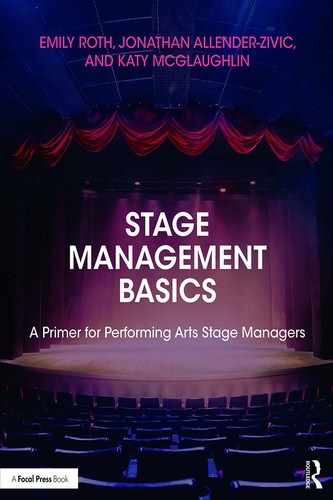Chapter Fourteen
Performances
Front of House
Front of house refers to the lobby area (box office, concession stand, etc.) and to the personnel who attend to these areas. House can also be in reference to the seating area of the theater or the audience.
House Manager
The house manager is the head of the front of house staff and is responsible for everything relating to the theater patrons. For performances, stage management works in conjunction with the house manager to coordinate when to open and close the house, and to gather a house count (total number of people in the audience for a given performance; this is often different from the number of ticket sales) and any important information about the audience (injuries, latecomers, dogs, oxygen tanks, etc.). Be sure to include the house manager in all time calls (either over headset or in person) so they have an idea of the progress backstage. Conversely, be sure to also coordinate your time calls with the status of the house. In some places house management will have the final say as to when the show begins.
Before calling places for actors at the start of the show and after intermission, always make sure to check in with the house manager to see if you need to hold the house for any reason (often latecomers or large crowds).
Opening the House
Opening the house refers to the time prior to a performance when the theater doors are opened to allow the patrons to make their way to their seats. The house typically opens thirty minutes prior to the performance. Before house opens, the preset checklist should be complete, as well as all fight calls, dance calls, mic check, and lights/sound checks. Be sure to check with everyone (house manager, actors, deck crew, and board operators) before allowing the house to open to make sure that everything is ready to go. Unless it is part of the performance, the audience should not see any of the prep work, as this disrupts the illusion of the show. Once the house opens, no one should walk onstage or through the house except front of house personnel.
If absolutely necessary (e.g., a technical problem that needs addressing), it is okay to hold opening the house. Be sure to communicate this information to any front of house personnel. If possible, it is preferable for the work to be done upstage of the main curtain (if one is in use).
Performance Reports
For every performance, the stage manager sends out a performance report to the same people as the rehearsal reports. This report should document the performance and contain any missed cues, any major actor mistakes, injuries, set, prop, and costume repairs, a house count, and the audience response. Like rehearsal reports, send this out by the following morning before the start of the workday, although preferably immediately following the performance (see Appendix R).
Always mention anything that has happened in the performance report; note if it has already been fixed or needs to be. Be as specific as possible, especially about the location of the item in question. “The USR Light” isn’t all that helpful if there are eighty USR lights, and “The bedroom unit needs touch-ups” isn’t always specific enough.
During performances, keep the promptbook in the theater at the stage manager’s station. If something unfortunate were to happen, this insures the show can go on and another person can step in to call the show.
